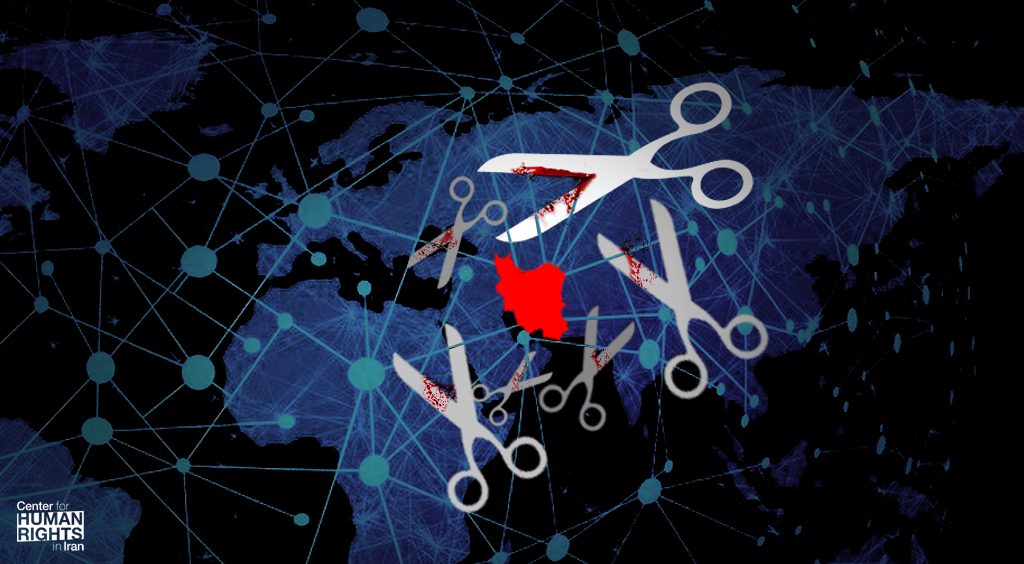Bill Increasing Surveillance and Censorship of Internet Moves Forward in Iran
 Authorities’ Efforts to Crush Dissent Will Also Crush Livelihoods
Authorities’ Efforts to Crush Dissent Will Also Crush Livelihoods
February 24, 2022 – A proposed bill that would drastically increase the Iranian authorities’ ability to censor and surveil activity on the internet in Iran has taken a significant step forward, with the passage of the outlines of the bill by a parliamentary committee on February 22, 2022.
If ultimately passed, the Bill for the Protection of the Rights of Cyberspace Users, also referred to as the Cyberspace Protection Bill, would further curtail Iranians’ already highly censored access to the internet and allow state security agencies to dictate how Iranians can use the internet.
The bill represents a blatant violation of the right to freedom of expression and access to information, the Center for Human Rights in Iran (CHRI) said in a statement today.
“This bill will not only intensify state censorship, it will also severely disrupt the daily lives of millions of Iranians who rely on the internet to conduct business and earn their living,” said CHRI executive director Hadi Ghaemi.
“Iran’s rulers are employing all available means to suppress the people,” Ghaemi added. “By ruthlessly trying to crush any expression of peaceful dissent, the authorities will also be destroying the livelihoods of millions of Iranians.”
The proposed bill, which is strongly supported by Iran’s conservative parliament, would:
- Require foreign social media platforms and providers of basic services that are used by millions of Iranians to share information and conduct daily business (such as Instagram, WhatsApp, Gmail, and Google) to adhere to state guidelines or else be blocked;
- Require internet service providers to remove content within 12 hours after being ordered by the authorities;
- Prohibit the sale of VPNs, which hide user identity and are used by millions of Iranians to access blocked sites and major online services;
- Allow military and intelligence agencies to control internet access inside Iran.
Now that the parliamentary committee has approved the outlines of the bill, it will debate the full bill. If the committee approves it, the bill will go directly to the Guardian Council, bypassing full parliamentary debate. Based on Article 85 of Iran’s constitution, parliament can delegate legislative power to its own committees “whenever necessary,” thus sidestepping the deliberation process that could hamper the bill’s progress. Once approved by the Guardian Council, the bill would be enforced throughout the country for a test period.
Opponents of the Bill Are Threatened
The bill, introduced by several Members of Parliament, was passed in its first reading in July 2021 and sent to a special Joint Parliamentary Committee on Internet Protection for detailed deliberations. After 45 meetings with officials from various agencies, 19 of its 20 members voted in favor of the bill’s outline (some reports said there were 18 yes votes).
“From now on, the joint committee will go over the details of the bill, line by line,” said the committee’s spokesman, Lotfollah Siahkali.
However, before the joint committee’s vote, opposing views were kept to a minimum. One member of the committee, Jalal Rashidi Kouchi even said he was threatened.
“I’m not an opponent of the state, nor a counter-revolutionary. I come from a family who has given five martyrs,” Kouchi told the Iranian Students News Agency (ISNA) on February 22. “Some people have contacted me and made threats to get me to back this bill… Is this bill aimed at creating order in cyberspace? The people don’t think so and I’m on their side.”
Kouchi also tweeted his letter addressed to the official in charge of parliamentary rules insisting that the committee had violated internal regulations in the way the voting was conducted.
The Cyberspace Protection Bill contradicts Article 9 of Iran’s constitution, which states:
“No individual, group, or authority, has the right to infringe in the slightest way upon the political, cultural, economic, and military independence or the territorial integrity of Iran under the pretext of exercising freedom. Similarly, no authority has the right to abrogate legitimate freedoms, not even by enacting laws and regulations for that purpose, under the pretext of preserving the independence and territorial integrity of the country.”
Iran’s parliament is controlled by an overwhelming majority of conservative and ultra-conservative members who were elected after the disqualification of other candidates, and after elections that saw the lowest number of votes cast in the history of the Islamic Republic’s parliamentary elections.
If they succeed in turning the bill into law, they could potentially upend the lives of millions of Iranians highly dependent on the internet. Iranian Supreme Leader Ali Khamenei’s supporters of the bill are taking their cue from Khamenei, who has often called for tighter internet controls.
“Well, the necessary regulations are unfortunately not observed in cyberspace, despite all my emphases,” Khamenei said in a speech on March 21, 2021, soon after parliamentary elections. “In certain aspects, cyberspace is completely free of any supervision. Those who are in charge should be careful. All countries in the world are controlling their cyberspace, but we are proud of letting it roam freely! There is no reason to be proud of this in any way. cyberspace should be managed.”
Read this article in Persian






